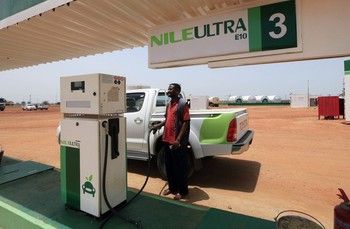Severe gasoline shortage hits Sudanese capital as fears mount over oil flow from south
December 22, 2013 (KHARTOUM) – The Sudanese capital, Khartoum has witnessed a sharp shortage in gasoline supply on Sunday while dozens of public transportation vehicles queued for fuel in gas stations.

Meanwhile, the head of the 2014 budget’s Sovereignty and Justice sector , Mohamed al-Hassan al-Amin, stressed that revenues from South Sudan’s oil transit fees would continue to appear in the budget, expressing hope that the ongoing conflict in South Sudan does not affect infrastructure.
He confirmed that flow of South Sudan’s oil through Sudanese territory has not stopped adding that dialogue to overcome the crisis in South Sudan is ongoing.
There has been rampant speculations that oil production in South Sudan and particularly in the Unity state would soon stop if clashes did not stop.
Daniel Howden from the Economist magazine said on Twitter yesterday that oil workers evacuated at Juba airport told him that “our [oil companies] HQ instructed us to close the wells (Unity State), the oil fields are shut down. All of them”.
Juba acknowledged today that defected SPLA army unit that is loyal to former Vice president Riek Machar has taken over the Unity state capital of Bentiu.
On Saturday, the fourth division commander of South Sudan’s army in oil-producing Unity state declared that he has deposed the caretaker governor and that his forces were no longer loyal to South Sudan president Salva Kiir.
About 500 people had been killed in Juba since clashes broke out last Sunday between presidential guard units from the competing tribes of the Dinka and Nuer.
Kiir Mayardit, a Dinka, accused his former deputy from the Nuer tribe and his supporters of orchestrating an alleged coup attempt to overthrow the government.
Machar denied plotting a coup and accused Kiir of using the clashes to get rid of his political opponents. He also rejected Kiir’s offer to sit down for talks unless the latter agrees to step down first.
The landlocked nation exports about 220,000 barrels of oil a day through pipelines across Sudan.
Khartoum expects to earn $500 million in revenue from transit fees of South Sudanese crude in 2013 since oil started flowing earlier this year after more than a year of suspension.
Sudan’s economy was hit hard since the southern part of the country declared independence in July 2011, taking with it about 75% of the country’s oil output.
(ST)
Read all Sudan Tribune‘s coverage of the South Sudan crisis here:
